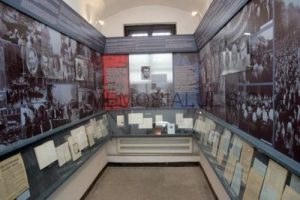In Czechoslovakia the communists took over the power on 25 February 1948. The same year, democrat leaders Eduard Beneš and Jan Masaryk were suppressed. The dissatisfaction caused by ideological hypocrisy and economic stagnation grown gradually and broke out glaringly after three decades, in 1968, through the trial of imposing inside the C.P. A “socialism with a human face”. The liberalisation during the “Spring in Prague” resulted in a reforming movement all around the Czechoslovak society, its programmatic document being “The manifesto of the 2000 words” launched by a group of intellectuals, led by Ludvik Vaculik.
The emancipation seemed so dangerous to Kremlin – and its acolytes from Hungary, D.R.G., Poland and Bulgaria – that in the night 20/21 June 1968 the Warsaw Treaty troops – from which Romania missed, to its honour – invaded Czechoslovakia, pretending that they were releasing it.
Thus, the hopes of millions of people who believed that socialism could be reformed and communist ideology is compatible with freedom died.
Later the Soviet imposed to the leaders of the “Spring in Prague” a gradual surrender and the stationing of Soviet troops for an undefined term, thus exclusions from the party and jobs followed, the return of censorship and terror, and the Czechoslovak society enterd a deep despair and apathy, in the so-called “normalization process”.
The suicide of student Jan Palach, followed by other few suicides as a protest, was the symbol of a long-term latent resistance. A lot of associations, movements, literary circles, surreptitious universities, jazz clubs were set up, unfolding an almost continous activity of human rights protection and harassment of the inertia of the communist regime led by Gustav Husák. The most important group of protesters was “Charta 77”, that functioned surreptitiously from January 1977 until November 1989, when the “Velvet Revolution” was victorious, promoting Václav Havel as the first man of the state.










